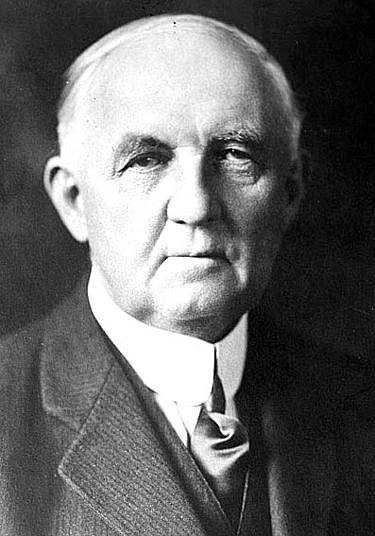"In politics, he did not seek office, but honors sought him, and he served with equal diligence whether as the only Republican United States Senator from Tennessee since Civil War days or whether as foreman of the Hamilton County Grand Jury." -- The Chattanooga News
As the news that former Sen. Newell Sanders had died spread across Chattanooga and the nation, tributes began appearing in newspapers, none more eloquent than the opening lines of a Chattanooga News tribute.
His life provides a glimpse into Chattanooga's progressive energy and the industrial growth that occurred during the late 19th and early 20th centuries.
The Sanders family were early North Carolina settlers, but the senator's father had first moved his family to Hawkins County, Tenn., followed by a trek to Kentucky, to Iowa and finally to Indiana, where the senator would be born in 1850. Sanders often relayed stories his father had shared about that journey to find a home. They had traveled on horseback and on foot with their small cache of household goods in a covered wagon. While in Iowa, John Sanders' small children were "captured by Indians and carried away." Sanders left his first wife in Iowa, followed the trail left by the captors and "recaptured his children, bringing them home." But Iowa had lost its appeal, and the family moved to Indiana.
Newell Sanders moved to Chattanooga in the decade after the Civil War at the encouragement of Gen. John T. Wilder. Sanders, an inventor who recognized the need for agricultural innovation, began to design plows, and the Chattanooga Plow Co. was incorporated in 1883. In a city that was embracing change, made possible by an influx of capital from new residents, Sanders became a business leader. By 1898, the Tennessee River Improvement Association had named him president since he had become a strong voice for a "plan" to develop the Tennessee River and its tributaries. A president of the Chattanooga Steamboat Co., he also served as a director of the Nashville, Chattanooga and St. Louis Railway, understanding that Chattanooga's unique position as a transportation hub could fuel industrial growth, create jobs and raise family income.
He also understood that the beauty of the Tennessee Valley was a marketable asset and worked to increase tourism and encourage relocation to Chattanooga, developing a surface railroad on Lookout Mountain.
Sanders, a Republican, served on the local school board and the board of aldermen. His leadership skills attracted the attention of Henry Clay Evans, who became his political mentor.
On April 9, 1912, the Nashville Tennessean headline announced, "Sanders Is Appointed United States Senator." The breaking news, carried in newspapers across Tennessee the following day, explained the appointment.
"Governor Ben W. Hooper last night formally announced the appointment of Hon. Newell Sanders, of Chattanooga, to be United States senator, to serve out the term of the late Senator Robert T. Taylor, which expires on March 4, 1913." Sanders, who chaired the Tennessee Republican Party's executive committee, was the anticipated appointment and promptly assured the public that he would "not be a candidate for election as senator before the legislature next January, nor would he aspire to reelection as chairman of the state committee."
The New York Times applauded the appointment in an article that also ran in the Chattanooga Daily Times. "It has often been said that in both houses of congress we have too many lawyers engaged in making our laws. A businessman, a successful businessman, now goes to the senate from the state of Tennessee ... . He is a man of ideas, sound, sensible and much respected."
In his year of service in the U.S. Senate, Sanders helped draft the Interstate Bill, prohibiting the shipment of liquor from "wet" into "dry" states. A champion for women's suffrage, he would later point with pride to Lookout Mountain's action as the first locality in Tennessee to give women the vote -- before the passage of the 19th Amendment -- and his wife's status as the first woman to vote in Tennessee and the South.
The former senator continued to serve Chattanooga's business and civic communities until his death in January 1939 at age 88. His obituary recalled that he had "served mankind in the three greatest fields in which it is possible to serve -- agriculture ... morality and temperance ... and public service and statesmanship."
Linda Moss Mines, the Chattanooga-Hamilton County historian, serves as secretary of the Chattanooga Area Veterans Council and honorary regent, Chief John Ross Chapter, NSDAR. For more, visit Chattahistoricalassoc.org.
